高中英语人教版必修4 Unit 4 Body language 课件(30张PPT)
文档属性
| 名称 | 高中英语人教版必修4 Unit 4 Body language 课件(30张PPT) | 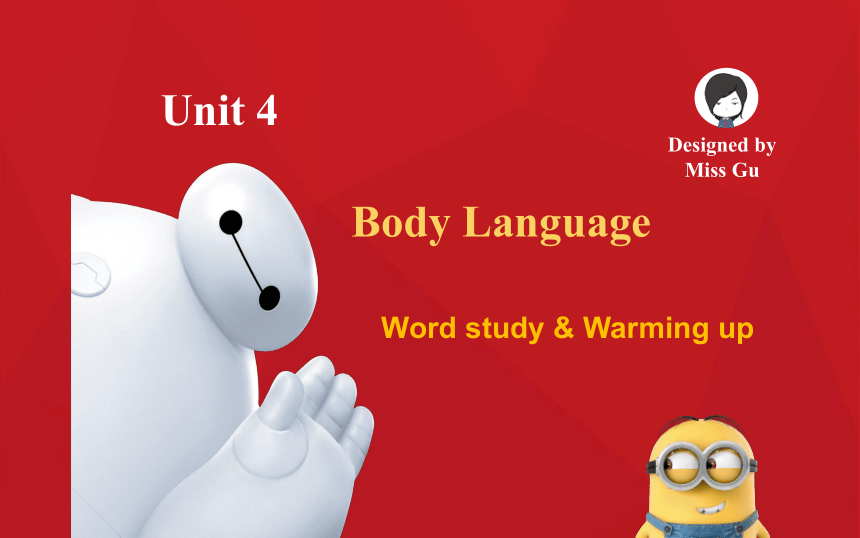 | |
| 格式 | zip | ||
| 文件大小 | 18.1MB | ||
| 资源类型 | 教案 | ||
| 版本资源 | 人教版(新课程标准) | ||
| 科目 | 英语 | ||
| 更新时间 | 2019-05-09 16:45:55 | ||
图片预览

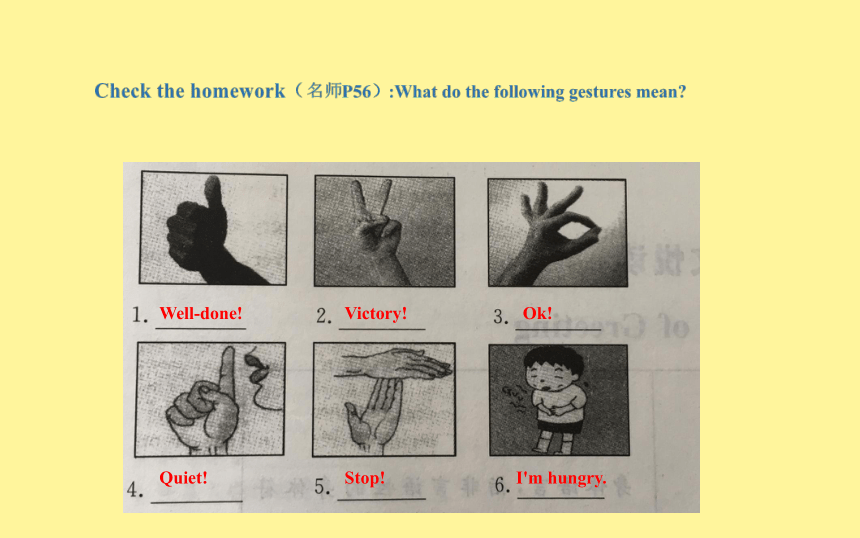

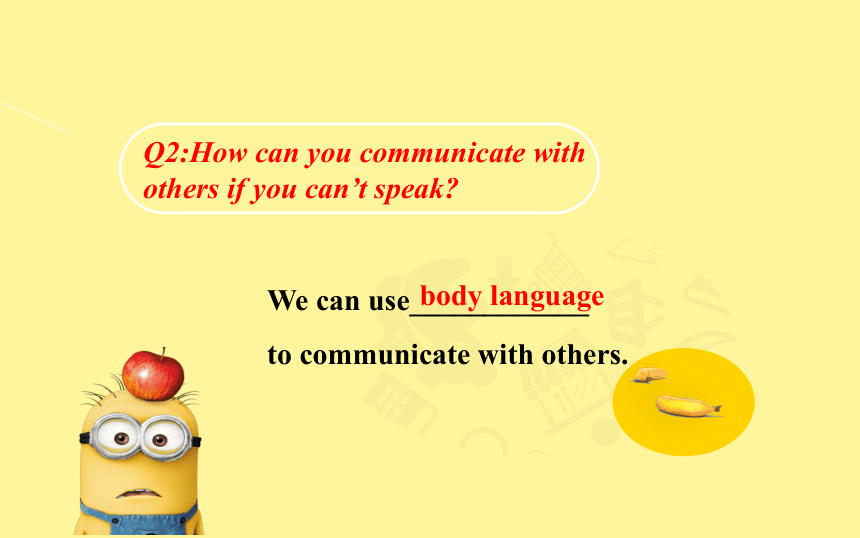
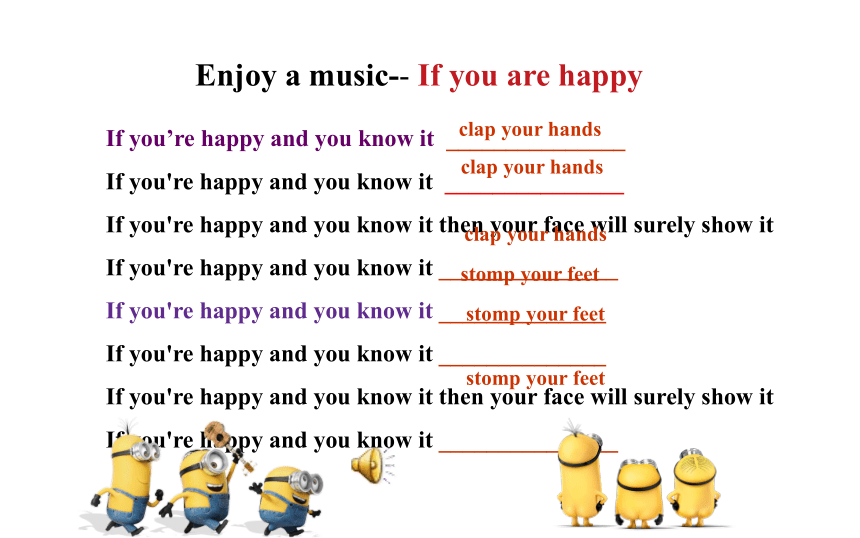
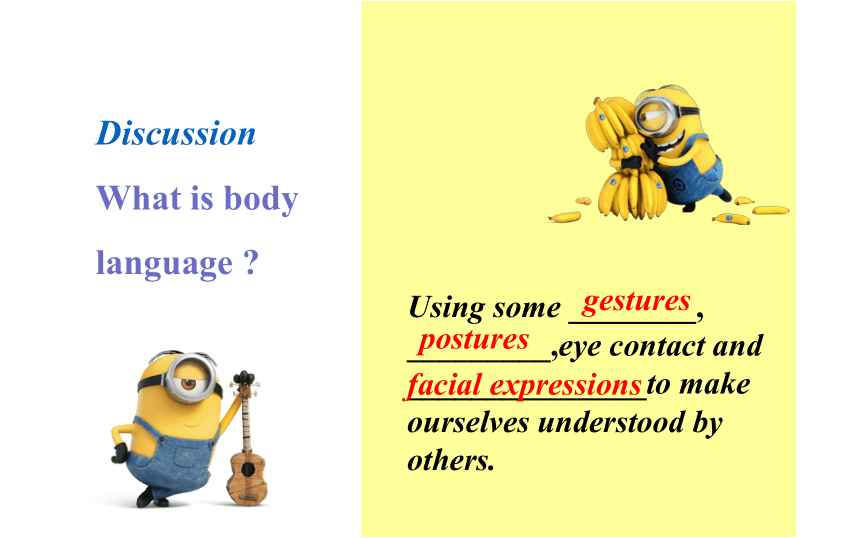
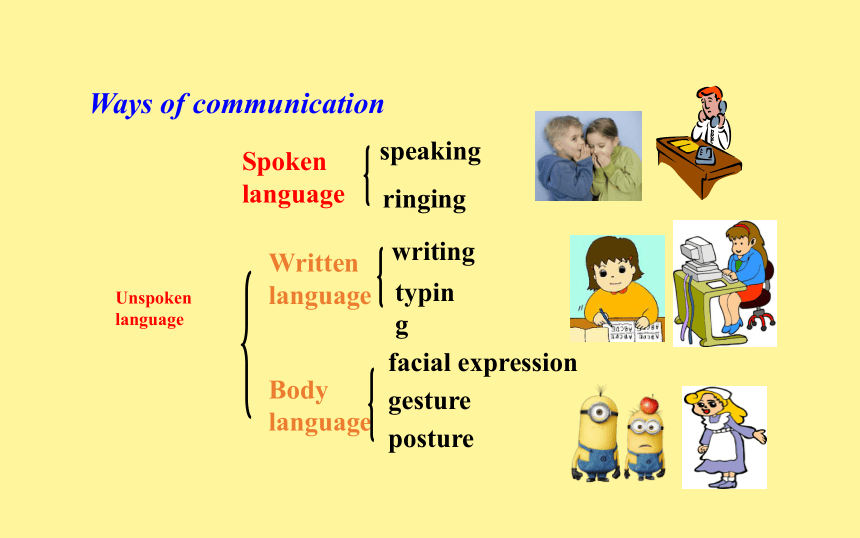
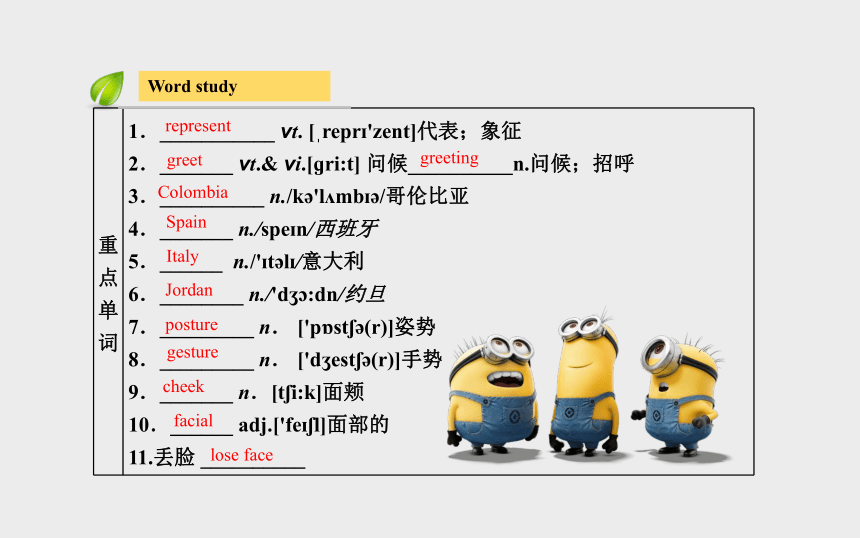
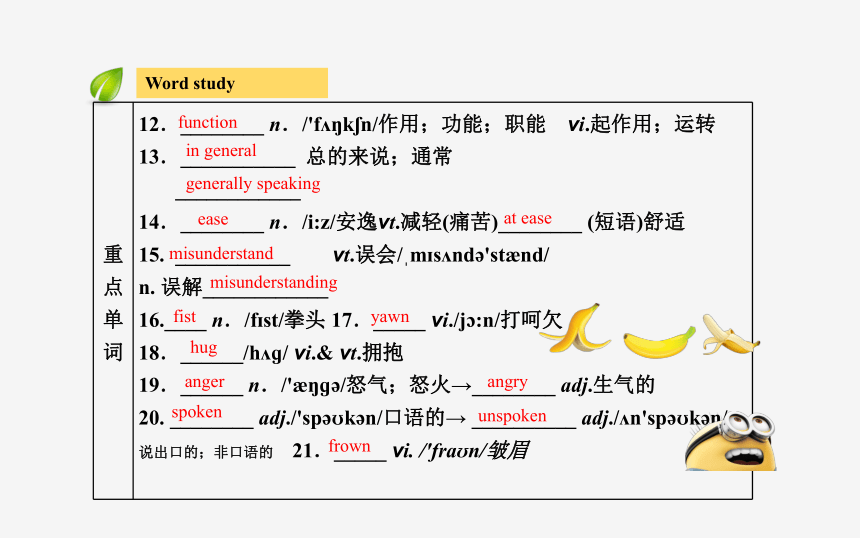
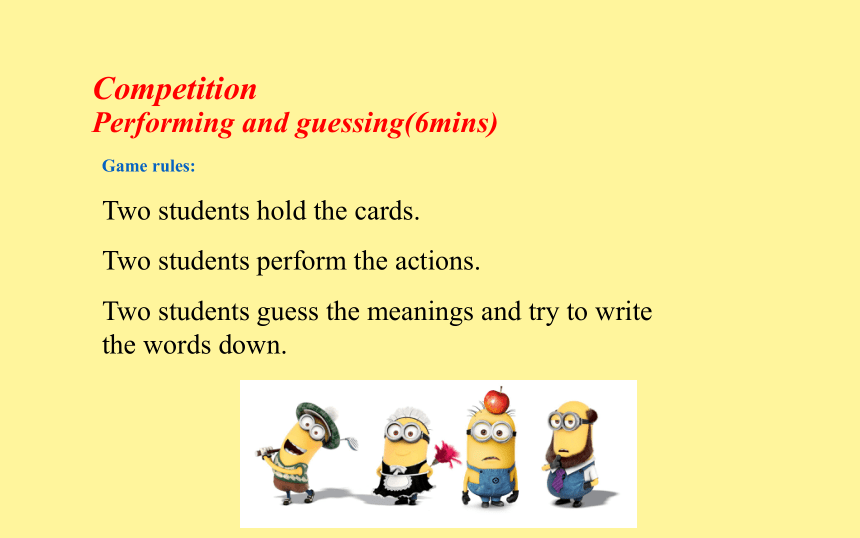
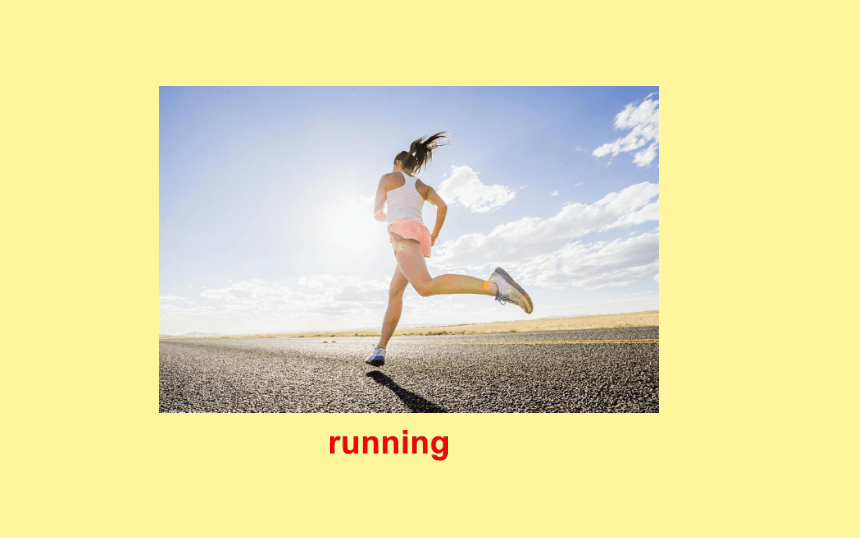

文档简介
Unit 4
Body Language
Designed by
Miss Gu
Word study & Warming up
Check the homework(名师P56):What do the following gestures mean?
Well-done!
Victory!
Ok!
Quiet!
Stop!
I'm hungry.
Think
Q1:What is the purpose of language?
The purpose of language is to ________________
other people.
communicate with
Think
Q2:How can you communicate with others if you can’t speak?
We can use____________
to communicate with others.
body language
If you’re happy and you know it _______________
If you're happy and you know it _______________
If you're happy and you know it then your face will surely show it
If you're happy and you know it _______________
If you're happy and you know it ______________
If you're happy and you know it ______________
If you're happy and you know it then your face will surely show it
If you're happy and you know it _______________
clap your hands
clap your hands
clap your hands
stomp your feet
stomp your feet
stomp your feet
Enjoy a music-- If you are happy
Discussion
What is body language ?
Using some ________, _________,eye contact and _______________to make ourselves understood by others.
gestures
facial expressions
postures
speaking
ringing
writing
typing
Spoken
language
Written
language
Body
language
Ways of communication
gesture
facial expression
posture
Unspoken language
重点单词 1.___________ vt. [?repr?'zent]代表;象征
2._______ vt.& vi.[ɡri:t] 问候__________n.问候;招呼
3.__________ n./k?'l?mb??/哥伦比亚
4._______ n./spe?n/西班牙
5.______ n./'?t?l?/意大利
6.________ n./'d??:dn/约旦
7._________ n.?['p?st??(r)]姿势
8._________ n.?['d?est??(r)]手势
9._______ n.[t?i:k]面颊
10.______ adj.['fe??l]面部的
11.丢脸 __________
Word study
represent
greet
greeting
Colombia
Spain
Italy
Jordan
posture
gesture
cheek
facial
lose face
重点单词 12.________ n./'f??k?n/作用;功能;职能 vi.起作用;运转
13.___________ 总的来说;通常
____________
14.________ n./i:z/安逸vt.减轻(痛苦)________ (短语)舒适
15. ___________ vt.误会/?m?s?nd?'st?nd/
n. 误解____________
16.____ n./f?st/拳头 17._____ vi./j?:n/打呵欠
18.______/h?ɡ/ vi.& vt.拥抱
19.______ n./'??ɡ?/怒气;怒火→________ adj.生气的
20. ________ adj./'sp??k?n/口语的→ __________ adj./?n'sp??k?n/未说出口的;非口语的 21._____ vi. /'fra?n/皱眉
Word study
function
in general
generally speaking
ease
at ease
misunderstand
fist
yawn
hug
anger
angry
spoken
unspoken
frown
misunderstanding
Competition
Performing and guessing(6mins)
Game rules:
Two students hold the cards.
Two students perform the actions.
Two students guess the meanings and try to write the words down.
running
Suprised
angry
hug
lose face
yawn
shy
burst into tears╱cry
stop crying
think deeply
Discussion: (P25)
What are these people communicating?
stomachache
go this way
Smile,wave, shake hands, hug ,kiss...
(P25)How many ways can you think of
to greet someone if you cannot speak?
How to greet each other in different countries?
In China╱Jordon, people are more likely to shake hands and smile when they meet.
In Russia╱Colombia, people kiss each other on the check three times.
In India, people put their palms together and nod their heads.
In New Zealand, Maori people(毛利人) touch noses when they meet each other.
function
Body language has positive ______in our daily life.In general, different ways of greeting_________ the cultures in different countries.
represents
function
Ba-na-na~
Quiz
1.They gave each other a ____(拥抱)when they met at the station.
2.Don't be afraid to_________(丢脸);making mistakes is common in the learning process.
3.You can select five things that _________(代表)Chinese culture.
4.She________(问候)us with a smile.
5.Her mother kissed her on the______.(面颊)
6.He _______ (很可能)leave Shonghai tomorrow morning .
7.___________,(一般来说)we enjoyed the trip.
lose face
represent
greeted
cheek
is likely to
In general
hug
Ba-na-na~
Quiz
8.Voice tone, hand gestures,__________ (姿势)facial__________, (表情)eye contact, and even the distance between you, can all send powerful messages.
9.There seems to be some_________________ (误解)about the matter.
10.I felt so sleepy that I couldn't stop_________.(打哈欠)
11.The most common facial expression is, of course, the smile-- its ________ (作用)is to show happiness and put people________.(使人放松)
12.Reading passages is beneficial to improving ________(口语的)English.
postures
expressions
misunderstandings
yawning
function
at ease
spoken
Body language is very important in our daily life, and it may vary from culture to culture. (因文化的不同而有差别)
When we are visiting other countries, we should follow their customs. That is to say,
When in Rome, do as the Romans do.
What can you learn from this class?
Summary
1.Remember the words we've learned in this class.
2.Preview the Reading--Communication:No Problem.(mark out the new words and expressions and write down the Chinese meaning )
3.Finish the exercise book on page 56-57 SectionI.
Homework
1
2
3
Ms.Gu
Thanks for your listening
Body Language
Designed by
Miss Gu
Word study & Warming up
Check the homework(名师P56):What do the following gestures mean?
Well-done!
Victory!
Ok!
Quiet!
Stop!
I'm hungry.
Think
Q1:What is the purpose of language?
The purpose of language is to ________________
other people.
communicate with
Think
Q2:How can you communicate with others if you can’t speak?
We can use____________
to communicate with others.
body language
If you’re happy and you know it _______________
If you're happy and you know it _______________
If you're happy and you know it then your face will surely show it
If you're happy and you know it _______________
If you're happy and you know it ______________
If you're happy and you know it ______________
If you're happy and you know it then your face will surely show it
If you're happy and you know it _______________
clap your hands
clap your hands
clap your hands
stomp your feet
stomp your feet
stomp your feet
Enjoy a music-- If you are happy
Discussion
What is body language ?
Using some ________, _________,eye contact and _______________to make ourselves understood by others.
gestures
facial expressions
postures
speaking
ringing
writing
typing
Spoken
language
Written
language
Body
language
Ways of communication
gesture
facial expression
posture
Unspoken language
重点单词 1.___________ vt. [?repr?'zent]代表;象征
2._______ vt.& vi.[ɡri:t] 问候__________n.问候;招呼
3.__________ n./k?'l?mb??/哥伦比亚
4._______ n./spe?n/西班牙
5.______ n./'?t?l?/意大利
6.________ n./'d??:dn/约旦
7._________ n.?['p?st??(r)]姿势
8._________ n.?['d?est??(r)]手势
9._______ n.[t?i:k]面颊
10.______ adj.['fe??l]面部的
11.丢脸 __________
Word study
represent
greet
greeting
Colombia
Spain
Italy
Jordan
posture
gesture
cheek
facial
lose face
重点单词 12.________ n./'f??k?n/作用;功能;职能 vi.起作用;运转
13.___________ 总的来说;通常
____________
14.________ n./i:z/安逸vt.减轻(痛苦)________ (短语)舒适
15. ___________ vt.误会/?m?s?nd?'st?nd/
n. 误解____________
16.____ n./f?st/拳头 17._____ vi./j?:n/打呵欠
18.______/h?ɡ/ vi.& vt.拥抱
19.______ n./'??ɡ?/怒气;怒火→________ adj.生气的
20. ________ adj./'sp??k?n/口语的→ __________ adj./?n'sp??k?n/未说出口的;非口语的 21._____ vi. /'fra?n/皱眉
Word study
function
in general
generally speaking
ease
at ease
misunderstand
fist
yawn
hug
anger
angry
spoken
unspoken
frown
misunderstanding
Competition
Performing and guessing(6mins)
Game rules:
Two students hold the cards.
Two students perform the actions.
Two students guess the meanings and try to write the words down.
running
Suprised
angry
hug
lose face
yawn
shy
burst into tears╱cry
stop crying
think deeply
Discussion: (P25)
What are these people communicating?
stomachache
go this way
Smile,wave, shake hands, hug ,kiss...
(P25)How many ways can you think of
to greet someone if you cannot speak?
How to greet each other in different countries?
In China╱Jordon, people are more likely to shake hands and smile when they meet.
In Russia╱Colombia, people kiss each other on the check three times.
In India, people put their palms together and nod their heads.
In New Zealand, Maori people(毛利人) touch noses when they meet each other.
function
Body language has positive ______in our daily life.In general, different ways of greeting_________ the cultures in different countries.
represents
function
Ba-na-na~
Quiz
1.They gave each other a ____(拥抱)when they met at the station.
2.Don't be afraid to_________(丢脸);making mistakes is common in the learning process.
3.You can select five things that _________(代表)Chinese culture.
4.She________(问候)us with a smile.
5.Her mother kissed her on the______.(面颊)
6.He _______ (很可能)leave Shonghai tomorrow morning .
7.___________,(一般来说)we enjoyed the trip.
lose face
represent
greeted
cheek
is likely to
In general
hug
Ba-na-na~
Quiz
8.Voice tone, hand gestures,__________ (姿势)facial__________, (表情)eye contact, and even the distance between you, can all send powerful messages.
9.There seems to be some_________________ (误解)about the matter.
10.I felt so sleepy that I couldn't stop_________.(打哈欠)
11.The most common facial expression is, of course, the smile-- its ________ (作用)is to show happiness and put people________.(使人放松)
12.Reading passages is beneficial to improving ________(口语的)English.
postures
expressions
misunderstandings
yawning
function
at ease
spoken
Body language is very important in our daily life, and it may vary from culture to culture. (因文化的不同而有差别)
When we are visiting other countries, we should follow their customs. That is to say,
When in Rome, do as the Romans do.
What can you learn from this class?
Summary
1.Remember the words we've learned in this class.
2.Preview the Reading--Communication:No Problem.(mark out the new words and expressions and write down the Chinese meaning )
3.Finish the exercise book on page 56-57 SectionI.
Homework
1
2
3
Ms.Gu
Thanks for your listening
同课章节目录
